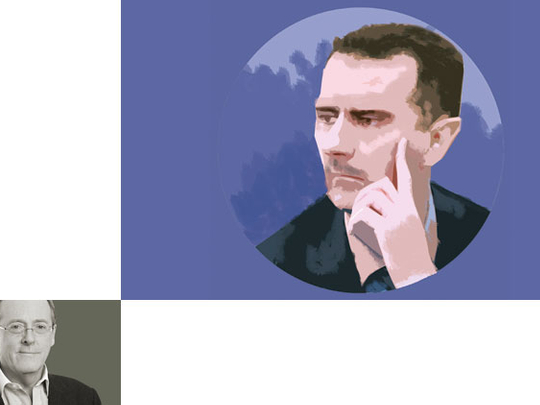
Conflicting information about the actual situation in Syria doesn't help its understanding. The point, however, is that everybody already has an opinion. Observers are thus moving along the lines of their political inclination, which obviously doesn't favour any honest analysis.
What is for sure is a few facts brought back by visitors. Factories are working up to 20 per cent of their capacity. The construction sector has ground to a halt. Foreign investors have disappeared. The two major cities of Damascus and Aleppo are quiet and the government, according to sources who recently met President Bashar Al Assad, is calmer than expected.
But some questions arise.
The two big cities are insulated from major unrest, but their periphery is not. The Syrian army remains largely loyal to the government, but defections can't be ignored anymore. Security is at stake in many areas, but quite often because of bandits who have little to do with both the army and the demonstrators. The Sunni traders' community continues to support the regime officially, but a growing number may be playing a double game.
Reading some Arab press reports of the unrest, not to mention listening to state TV, one feels the media is behaving like frontline fighters: "There are reports of more carnage …", "According to some sources …", "It is said that …". Nobody knows who these sources are or where the reports come from. Yet, the point is not there: the regime must disappear because "the age of endless and absolute power is over", as one read in a Saudi gazette, which probably knows best what it is talking about.
Wouldn't the situation — and related consequences at the regional level — be thus a bit more complex than what is usually presented by a trendy intelligentsia?
‘Black holes'
The situation seems more or less under control now. Of course, there are a few ‘black holes' and the city of Homs is certainly one of them. But demonstrations have receded and the brutal crackdown by the authorities seems to have had results.
Yet, Al Assad will probably never recover complete control of the country whereas demonstrators, upon their turn, may move towards open insurrection — a hypothesis reinforced by the growing smuggling of arms into the country.
Abroad, Syria's only support comes from Iran due to well-known regional considerations. Lebanon keeps more or less quiet, but that is not the case with other Gulf Cooperation Council states who, as in Saudi Arabia, are very shocked by what is happening to their Sunni brethren. Turkey, at one point, put pressure on Syria, until it realised there were over 10 million Alawites at home; not to mention their growing consideration of the Kurd issue. Two weeks ago, in a remarkable show of solidarity, the Arab League came up with a roadmap for peace, which has as much chance of being a success as other plans before it.
As for the US and Israel, whatever weakens an Arab state is welcome as it improves what is perceived as the security of Israel. Finally, Europe is hardly worth mentioning since nobody really cares. French President Nicolas Sarkozy and his friend Bernard-Henri Levy were probably too busy, these days, after they discovered what the word ‘democracy' meant from the Libyan National Transition Council.
Putting aside naive attitudes, real agendas and bad faith, a central fact remains: observers acknowledge that the Syria situation is deadlocked and a solution would take many more months. This situation, however, cannot be satisfactory when the risk of civil war grows with every passing day.
"Who likes the Baathist regime?" we asked nine years ago in similar columns. "Nobody, of course," was the answer with talk about the best ways to overrun a dictatorship. Can such a regime amend itself? The answer is still a ‘no' for many citizens who suffered its brutality. Yet, who can deny that some form of progress has been achieved between 2005 and 2010 in Syria?
It was surely not freedom of thinking, end of corruption and a widespread feeling of safety, but things were moving in a better direction. All this has obviously stopped, but the future cannot be a choice between reinforced dictatorships and civil war. So, the big question is: how can the opposition be calmed down?
Surely, not by killing people. Surely, not by pitting Christians against Muslims, who have lived in peace for years. And probably not by prosecuting Al Assad for crimes against humanity.
Thus there is little room for anything else, but the necessary emergence of a kind of discussion between all parties involved, at home and abroad. The risk of a devastating civil war is too big, and it would be on the conscience of whoever refuses to initiate talks.
Luc Debieuvre is a French essayist and a lecturer at the Institut de Relations Internationales et Stratégiques and the FACO Law University of Paris.









